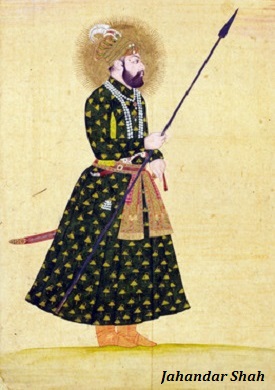
- Modern Indian History - Home
- Decline of Mughal Empire
- Bahadur Shah I
- Jahandar Shah
- Farrukh Siyar
- Muhammad Shah
- Nadir Shah’s Outbreak
- Ahmed Shah Abdali
- Causes of Decline of Mughal Empire
- South Indian States in 18th Century
- North Indian States in 18th Century
- Maratha Power
- Economic Conditions in 18th Century
- Social Conditions in 18th Century
- Status of Women
- Arts and Paintings
- Social Life
- The Beginnings of European Trade
- The Portuguese
- The Dutch
- The English
- East India Company (1600-1744)
- Internal Organization of Company
- Anglo-French Struggle in South India
- The British Conquest of India
- Mysore Conquest
- Lord Wellesley (1798-1805)
- Lord Hastings
- Consolidation of British Power
- Lord Dalhousie (1848-1856)
- British Administrative Policy
- British Economic Policies
- Transport and Communication
- Land Revenue Policy
- Administrative Structure
- Judicial Organization
- Social and cultural Policy
- Social and Cultural Awakening
- The Revolt of 1857
- Major Causes of 1857 Revolt
- Diffusion of 1857 Revolt
- Centers of 1857 Revolt
- Outcome of 1857 Revolt
- Criticism of 1857 Revolt
- Administrative Changes After 1858
- Provincial Administration
- Local Bodies
- Change in Army
- Public Service
- Relations with Princely States
- Administrative Policies
- Extreme Backward Social Services
- India & Her Neighbors
- Relation with Nepal
- Relation with Burma
- Relation with Afghanistan
- Relation with Tibet
- Relation with Sikkim
- Relation with Bhutan
- Economic Impact of British Rule
- Nationalist Movement (1858-1905)
- Predecessors of INC
- Indian National Congress
- INC & Reforms
- Religious & Social Reforms
- Religious Reformers
- Women’s Emancipation
- Struggle Against Caste
- Nationalist Movement (1905-1918)
- Partition of Bengal
- Indian National Congress (1905-1914)
- Muslim & Growth Communalism
- Home Rule Leagues
- Struggle for Swaraj
- Gandhi Assumes Leadership
- Jallianwalla Bagh Massacre
- Khilafat & Non-Cooperation
- Second Non-Cooperation Movement
- Civil Disobedience Movement II
- Government of India Act (1935)
- Growth of Socialist Ideas
- National Movement World War II
- Post-War Struggle
- Clement Attlee’s Declaration
- Reference & Disclaimer
Modern Indian History - Jahandar Shah
After Bahadur Shahs death, a new element entered Mughal politics i.e. the succeeding wars of succession. While previously the contest for the power had been between royal princes only, and the nobles had hardly any interference to the throne; now ambitious nobles became direct contenders for the power and used princes as mere pawns to capture the seats of authority.

In the civil war, one of Bahadur Shah's weak sons, Jahandar Shah, won because he was supported by Zulfiqar Khan, the most powerful noble of the time.
Jahandar Shah was a weak and degenerate prince who was wholly devoted to pleasure. He lacked good manners, dignity, and decency.
During Jahandar Shah's reign, the administration was virtually in the hands of the extremely capable and energetic Zulfiqar Khan, who was his wazir.
Zulfiqar Khan believed that it was necessary to establish friendly relations with the Rajput rajas and the Maratha Sardars and to conciliate the Hindu chieftains necessary to strengthen his own position at the Court and to save the Empire. Therefore, he swiftly reversed the policies of Aurangzeb and abolished the hated jzyah (tax).
Jai Singh of Amber was given the title of Mira Raja Saint and appointed Governor of Malwa; Ajit Singh of Marwar was awarded the tide of Maharaja and appointed Governor of Gujarat.
Zulfiqar Khan made an attempt to secure the finances of the Empire by checking the reckless growth of jagirs and offices. He also tried to compel the (nobles) to maintain their official quota of troops.
An evil tendency encouraged by him was that of ijara or revenue-farming. Instead of collecting land revenue at a fixed rate as under Todar Mals land revenue settlement, the Government began to contract with revenue farmers and middlemen to pay the Government a fixed amount of money while they were left free to collect whatever they could from the peasant. This encouraged the oppression of the peasant.
Many jealous nobles secretly worked against Zulfiqar Khan. Worse still, the Emperor did not give him his trust and cooperation in full measure. The Emperor's ears were poisoned against Zulfiqar Khan by unscrupulous favorites. He was told that his wazir was becoming too powerful and ambitious and might even overthrow the Emperor himself.
The cowardly Emperor could not dismiss the powerful wajir (Zulfiqar Khan), but he began to intrigue against him secretly.